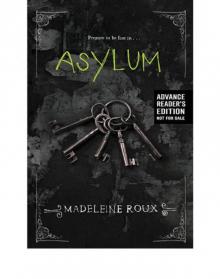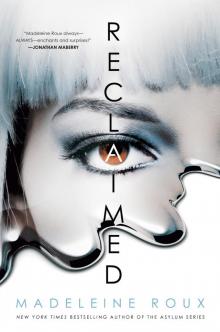- Home
- Madeleine Roux
Reclaimed Page 4
Reclaimed Read online
Page 4
It was all deceptively simple. A single chair. A pair of headphones. Simple.
Han drew in a deep breath and tried to get comfortable on the chair, which wasn’t hard, given how nicely padded and upholstered it was. Then came the headphones, also expensive and comfortable, noise canceling, fluffy as new pillows pressed to his ears.
It wasn’t Kris that greeted him through the headphones but a calm, smooth, disembodied voice, androgynous and soothing. A little quizzical, like they had a secret.
Good afternoon, Han Jun, the voice said. Just as he suspected, Dunn’s technology interfaced with Han’s implant. He remembered skimming the permissions for that in the complex NDA. Similar to the augmented-reality advertisements that bombarded him on the station promenades, this program could appear right before his eyes, a slim, angular figure projected there for him. Like the voice, they were genderless and pleasant, dressed in a formfitting white smock and leggings, their head bald, the features of their face large, exaggerated and almost alien.
Your intake forms indicate that you prefer to be called Han, is that correct?
Yes.
Han had only to think his responses. This thing was jacked directly into his head, interfacing with his VIT implant, and after all, he didn’t want to make things too easy. But as expected, the projection—the program—heard him loud and clear.
You can call me Patron, Han. This is a preliminary mapping exercise, to find the parameters and boundaries of your unwanted memories. No adjustments to your memories will be made today, and no changes will ever be made without your consent.
You’re the technology?
Patron smiled, but with their almost plastic face it didn’t touch or wrinkle their big, black eyes. I am merely a program speaking to you through your VIT-compatible implant. An avatar, if you will, of the neural-mapping system developed by Merchantia Solutions Corporation in partnership with Belrose Industries, a proprietary program operated by Paxton Dunn. You see, the LENG program cannot be run here, as the necessary hardware is on Ganymede. If you are chosen for the test, then you will experience the real technology there.
Got it.
The smile on their face faded, and Patron folded their hands placidly in front of their waist. I need you to think about your mother, Han. The avatar’s eyes seemed to grow larger, blacker, enticing in a way he couldn’t quite describe, as if they could physically draw the memory of his mother out of him, whether he wanted to or not. I would like you to remember her voice.
Han winced. Her voice, his greatest weakness.
Straight to business, then, he thought.
Would you like for there to be pleasantries?
I guess not.
That same wide, strange smile appeared on Patron’s egg-like face. Our time together is short and precious, Han. Please cooperate, unless you would like to terminate this exercise and forfeit your application for testing.
It’s just hard. He squirmed in the chair. His hands throbbed, and he noticed that the room felt abruptly hot, suffocating. Patron took a small step toward his chair. I don’t like thinking about her. I’ve tried . . . I’ve tried and tried to forget.
But you can’t forget, Patron said with a sigh. And that’s why you’re here. And why we’re here—to help you. I know it’s uncomfortable, but I need you to concentrate. I need you to focus on what hurts the most. Show us where it is, show us what it is, help us help you, Han.
His thoughts drifted at once to the woman with the shiny hair out in the lobby. Did the technology know? Something must have worked, because Patron nodded.
Pathways engaged. Strong activity in the amygdala. Elevated heart rate. Please continue, Han. But as I instructed, focus. Be specific.
Han closed his eyes and licked his lips. This was Paxton Dunn’s technology, his baby. His hero’s baby. He had to trust it. More than anything, and maybe foolishly, he just wanted it to work.
The morning of. His mother was running late for her flight. Work trip. She had recorded all the guided tour audio for a Merchantia Solutions research campus on Mars. There was only one flight that day leaving from Tokyo Bliss Station to Nolan-Beale Base in Chryse Bay, and she had to be on it. Bored, insomniac from staring at his computer all day, he had spent the night messing with the automated systems in the condo, trying to make the chime say, “Han is king!” whenever someone triggered the motion sensor on the door to his room. Usually that required permissions only his mom had in the system, but he found a way in. A forced factory reset did the trick, but it also erased Mom’s morning alarm.
I don’t care what you think! You are not always the smartest person in the room!
Her face looked like it was cooking while she screamed at him from his bedroom doorway. She had gotten dressed in such a hurry that the buttons on her jacket weren’t done up correctly, and when he pointed it out, sitting cross-legged on his bed, still wide awake at five a.m., she grabbed her bag and stormed away. The swing of her purse caught the door sensor.
“Han is king!”
His mother had let out a roar at that, and then she was gone. She made her flight, informing him of as much in a clipped text. He had saved it, of course, and she was still a contact in his VIT. There were still nights he dreamed that his VIT monitor buzzed on the bedside table, and when he scrambled for it in the dark, his mother’s face beamed back at him. Even in the dream, there was a strange hollowness to her eyes, as if even his subconscious knew that this was perilously wishful thinking.
Patron was saying something, but he couldn’t follow. That day—those memories—were a riptide, and once he went under, there was no clawing his way back. Everything around him faded, and there was only the dark fog that filled his brain. The only way through was to follow a single light, tempting and bright, but like fabled lights in stories of dark forests, it only led to despair.
And loss.
The day of her trip to Mars, his VIT really had received a call from her, but unlike in his dream, he didn’t wake up to receive it. After the insomniac adventures of the night before, he crashed and crashed hard. Crashed. Han licked his lips again, faster, flattening his palms against his thighs as he trembled on the chair.
I want it out. Get it out. Get it out of me! I can’t hear her say it one more time . . .
Breathe. Patron’s voice hovered on the edges of his hearing. Breathe, Han. Take me to the hurt.
The next morning he woke to a voice message from his mother. Her face greeted him around noon on his monitor as he reached for it after rolling out of a fitful doze. Probably just a quick word to say she had landed safely. The expected stuff.
“Sweetie? Are you there? Pick up! Han? Oh, Han, wake up, please just wake up! Oh my God. Something has breached the atmosphere. All the alarms . . . all the alarms here are going. They won’t tell me what it means, God, they won’t tell us anything—”
Alarms screamed. Humans screamed. Someone not his mother could faintly be heard saying, “We need to move. Now.”
Later, when the message cut and he realized that he would never see his mother again, he felt cold and damp all over, and discovered that he had gone numb and wet the bed. Green text had flashed over his mother’s face on his VIT, an incoming call from his brother. Through the gray frosted glass of his door, he had noticed his Servitor nanny hovering, waiting to come in. Maybe it really did have a heart, and that was why it hesitated. Then the door had hissed open and the AI nanny toddled through.
“Han is king!” the chime had sounded.
“Get it out!” Han sat up in the chair, and the projection of Patron wavered for a moment, distorting. It snapped back to a crisp image, and Patron came forward, hands folded as if in prayer.
Breathe in through your nose and out through your mouth. Yes, like that. The pathways are clear, Han, the pathways are strong, they said, then gesturing up with their hands, toward the nose, then pushing outward as if exh
aling.
Han did as they said, glancing down, sure he had soiled himself. No. He was all right. His hands had taken big bunched fistfuls of his pants, and when he let go, there were sweat marks and wrinkles.
“W-What does that mean?” he asked, blinking rapidly as if the room were very bright. It wasn’t, but Patron gleamed, perfectly smooth, reflective as a polished agate.
It means we can help you, Patron told him, offering what smile they could, given their strange, alien face. It means the technology can take it all away.
4
“Do you think you got it?”
Senna hadn’t even had time to flick her shoes off next to the door before Marin’s voice rang out from the kitchen. The condo, small, cool, and tidy, wasn’t situated on the more sought-after upper levels of the station, but Senna had put up with far more meager conditions. Marin made a decent living in IT but the hours were hellish; she was constantly on-call in case anything went wrong with the servers controlling the station’s Servitor-based security force, PaxDiv. There were times Senna watched her fly out the door in the middle of a meal, or after an alert roused her before dawn.
“I’m not sure,” Senna called back. Her brown shoes looked misshapen next to Marin’s pumps, two perfect, sleek black heels lined up neatly to the right of the door, not a mark on them. Her voice shook as she added, “It was . . . it wasn’t what I expected.”
“What did you expect?”
Senna hunted for her voice, leaving behind the cramped foyer and passing under a square opening into the open-plan living space. A tinted window to her right offered one of the only outward views of the station itself. Most of the windows were fake, with simulated vistas. Jonathan preferred beaches, pre-cataclysm Bali specifically.
A few white patent leather sofas and a vid projector were clustered to the right, and to the left, a recessed kitchen went deeper into the condo. Behind the tall bar counter that separated the kitchen from the living area, Marin was dumping ice into a cocktail shaker, her black hair pinned tidily behind her ears. It was a good thing she didn’t look too much like her sister, or the shock of seeing her every day would’ve become too much. Mina had been smaller, almost fragile, with mousy brown hair and gentler eyes. Once, on the compound, Mina had told her that she looked just like her father, and Marin took after their mother.
The sisters shared the same lips, so Senna always stared at Mina’s eyes when she talked.
“I don’t know,” Senna admitted with a shrug. The whole thing had been so bizarre, she hardly knew where to begin. Paxton Dunn’s people had arranged a transport for her back to the apartment so she didn’t have to take the public elevators or light rail. The receptionist, Kris, had noticed that Senna didn’t have a VIT, and made all the arrangements quickly and silently, without asking. The driver hadn’t spoken a word to her the entire time. The interior of the transport smelled overwhelmingly—chemically—of spearmint. Senna’s mind kept wandering back to the boy she had seen in the lobby. Tall, thin, Asian, with intensely accusatory eyes. Bloodshot eyes, in fact, and he had the paper-thin, acne-spotted skin of the insomniac. She knew the look well.
There was so much rage in his eyes . . . the way he talked to her, like they were acquainted, like he had every reason in the world to hate her . . .
Senna sighed and leaned against the counter, listening to the rhythmic shurk-shurk-shurk of Marin mixing a drink.
“I thought you and Jonathan—” But she stopped herself. It was none of her business.
Marin smirked and shrugged. She was wearing a prim and tailored red suit, a gold necklace fastened tight around her neck, close enough to leave a little sub-necklace of welts. “Yeah, not exactly my prenatals. Whatever. I’m not pregnant yet. At least I don’t think so, and after the day I’ve had . . .” Marin winked one of her long, false lashes and dumped the cocktail shaker contents into a glass that could’ve been mistaken for a pitcher. The liquid was electric blue.
“Who cares about my shitty day,” Marin added, cozying up to the bar. “I want to hear more about this Dunn guy’s office. Jonathan thinks he’s not even real.”
Senna frowned, the scent of blueberries wafting strongly from the drink. Behind Marin, the kitchen had been neglected, clean and dirty dishes piled high next to the washer, cartons of takeout food stacked beside that. Someone needed to make a garbage disposal run, but the station charged for every use, and Jonathan liked to push it until things started to smell.
“How could he not be real?” Senna asked. “He invited me to do this experimental therapy, right? People must know what he looks like.”
“I know, I know, it’s fucking stupid. Whenever he’s interviewed it’s just a silhouette. Adds to his mystique, I suppose.” Already half done with her drink, Marin was eyeing the cocktail shaker again. “Sometimes I ask Jonathan if he loves those idiot conspiracy theories because our life is too boring, but he says that’s not it. I don’t know, I don’t get it, he’s a smart guy! Well, real or not, do you think you passed the test or whatever? Is that what it was?” She smiled and her teeth were lightly stained blue. “A test?”
“It was more like a clinical exam,” Senna admitted. Marin pointed to the shaker and lifted a brow, but Senna shook her head. There was no drinking in the compound, and the last time Marin had tried to get her to drink, Senna had wound up sick and dizzy the next day. Preece was wrong about a lot of things, but maybe not about alcohol. “They wanted to do some neural imaging, figure out if they could really delete my memories.”
Marin shuddered and pretended to gag, the sight made all the more ghoulish by her stained teeth. “Delete your memories. It sounds so fucking intense when you put it like that.”
“It’s intense no matter how you put it,” Senna replied. “I had to . . . They made me think about the crash. I had to go over all of it. It felt like walking them through a dream, but it must have worked. They didn’t tell me much, just that the data collection was successful.”
“That must have been hard,” Marin said softly, no longer as interested in her cocktail. “You okay?”
“I should probably sit down.” Light-headed. Tired. For a year, Senna had lived in the fog of despair, basic things like showering or getting up to have breakfast seemingly monumental. It was like living under a great, looming shadow, an avalanche of pain waiting to crush her the second her mind strayed to the wrong thing. She crossed to one of the sofas and dropped down, holding her face in her hands, elbows propped on her knees.
Painting had been her light and joy in the compound, but she couldn’t even do that anymore. All her supplies had been incinerated. Once the area was no longer considered a crime scene, station authorities probably wiped out all her murals.
“Let me get you some ice water,” Marin muttered.
“I’m fine, really.” Adrenal fatigue, that was what one of Senna’s many doctors told her had happened. Too much stress, too much grief, too many changes all at once. Her body had shut down, but Senna was still waiting for it to open up again.
“Shut up.” Marin came to the sofa with the water, and of course she was right. As soon as Senna’s hands closed around the cold, smooth cup, she felt a little better, and the tide of nausea rising in her stomach ebbed. With a little shudder of relief, Marin pulled off the sleek black style she wore as a wig and tossed it across the room. She scratched at her scalp, and at the thinning hair there. Senna looked away, feeling as if she were staring at something private.
“These new anxiety drips are amazing,” Marin murmured, seemingly unbothered by the clump of hair that came away in her hand. “Guess I was lucky enough to get one of the rarer side effects. Oh well. Wigs are expensive, but peace of mind is priceless.” She relaxed back against the sofa, glancing at her VIT, and then her eyes popped open wider. “When you’re feeling steadier, there’s something I need to give you.”
Senna lifted her head, moving the hair out of her eyes. �
��What is it?”
“Station Affairs sent it over,” Marin said, laughing at Senna’s groan. “They’re not going to stop bothering us. You know that, right?”
“I do.” It was part of why Senna felt it was her time to leave. She couldn’t be held liable for what happened on the Dohring-Waugh. The crash wasn’t her fault, but she was the sole survivor. All the questions, all the investigations, led back to her. After she was recovered from the evac pod, SA had taken her into custody. It was the first night she spent alone in a little room all by herself, and the isolation was devastating.
“Here.”
Senna hadn’t even noticed the small package that had been sitting on the coffee table. It was only just larger than a man’s fist, wrapped in nondescript black plastic.
“If it’s a bomb,” Marin joked, placing the package next to Senna on the sofa, “I’m going to haunt you forever.”
“It wouldn’t be,” Senna replied with a thin smile. “Station Affairs has their hands full with me already. They wouldn’t add another problem to their list.”
“True!”
Senna peeled off the black plastic, and inside she found a new model VIT, the latest version. On the image of the VIT monitor itself, the agent assigned to her case had written, Just wear it. Please?
“Will you?” Marin asked, pointing to the inscription.
“Agent Tiwari has been pretty patient with me,” Senna sighed. “So I owe him.”
Marin put her hand on Senna’s shoulder and squeezed. “You didn’t do anything wrong, Senna. You don’t owe him anything.”
Senna didn’t know if that was true. People wanted answers. Justice. Blood. Even the laws had changed after the crash. Now every citizen applying for resident status on Tokyo Bliss Station had to opt in to being traced through their implant. Preece had claimed religious exemption for the compound; that was how they all managed to go about their lives without implants or VITs. Every week or so, another message arrived from Agent Tiwari, reminding Senna that she wasn’t exempt either, that she was also subject to the law. Senna just kept putting it off.

 Asylum
Asylum The Warden
The Warden The Bone Artists
The Bone Artists Allison Hewitt Is Trapped
Allison Hewitt Is Trapped Court of Shadows
Court of Shadows The Scarlets
The Scarlets Escape From Asylum
Escape From Asylum The Shining Blade
The Shining Blade Shadows Rising (World of Warcraft: Shadowlands)
Shadows Rising (World of Warcraft: Shadowlands) Salvaged
Salvaged Sadie Walker Is Stranded
Sadie Walker Is Stranded Catacomb
Catacomb Reclaimed
Reclaimed Shadows Rising (World of Warcraft
Shadows Rising (World of Warcraft Tomb of Ancients
Tomb of Ancients